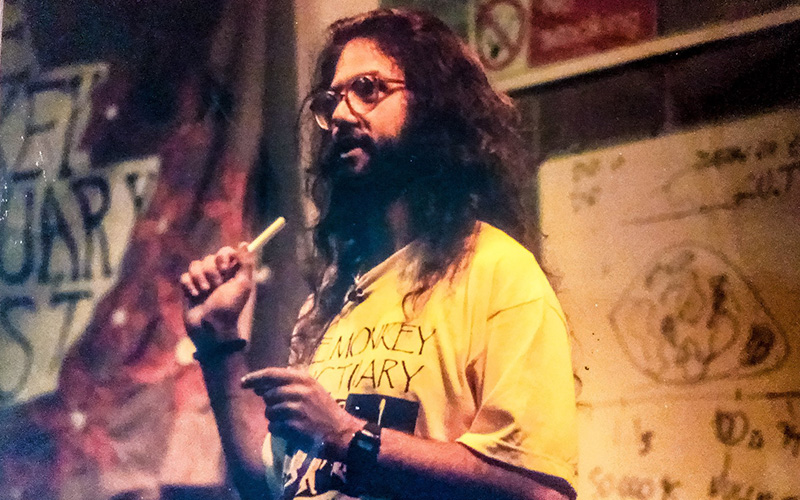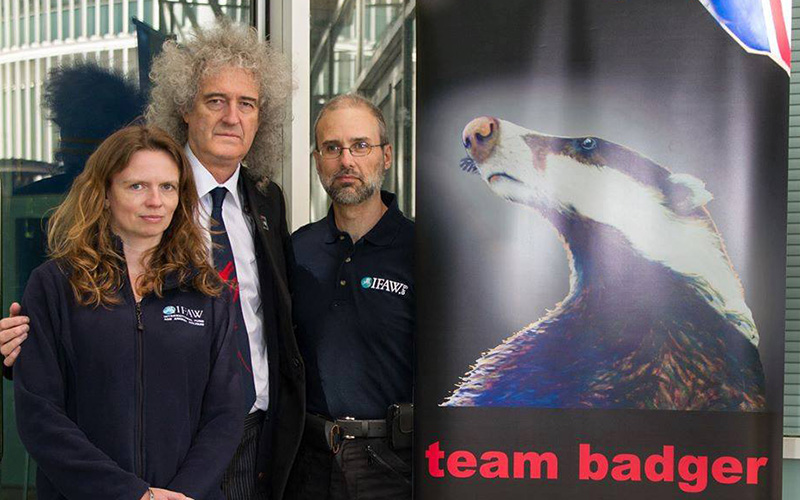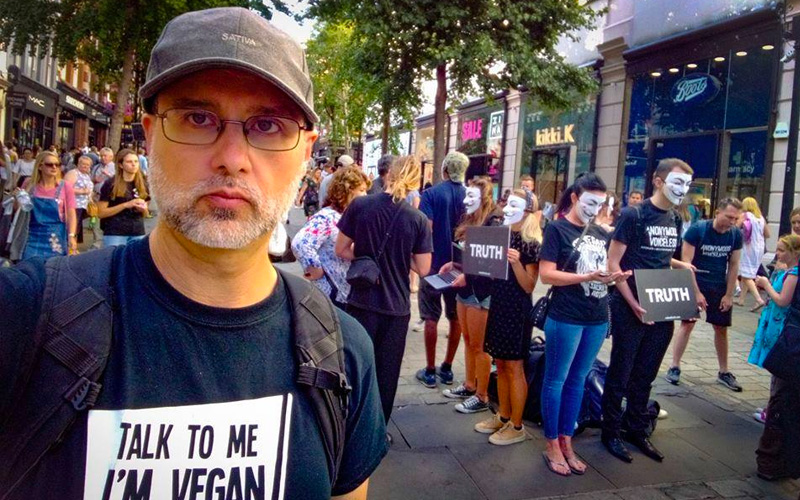Jordi Casamitjana is an ethologist and animal rights activist that’s fighting to protect ethical veganism under the UK’s 2010 Equality Act. This is a landmark case that can potentially set a precedent for other cases, providing legal protections for ethical vegans around the world.
After reading the sensational and sometimes rude headlines from other media outlets, SoFlo Vegans wanted to give Jordi Casamitjana an opportunity to share his story with our community.
Sean Russell:
First I want to thank you for taking the time to speak with us. We are having this interview several days before your groundbreaking court hearing and I’m sure a lot is going through your mind. Before we dig into the circumstances behind this case, I would love to learn about your road to becoming an ethical vegan.
Jordi Casamitjana:
Well, in a nutshell, my road goes like this: Catalonia, Wasps, Britain, Animal protection, and “The Demon’s Trial”. Let me explain. I was born in Catalonia in the ’60s when it was occupied by a Spanish fascist dictator who severely oppressed Catalan people. Those first years of my life being the victim of political oppression caused in me a strong empathy towards any other victim of oppression…and who is more oppressed in this world than all the animals that are exploited by humans?” This led me to became a zoologist as I wanted to be closer to animals and away from all these “dangerous” and “hostile” humans. I specialized in animal behavior, and the first animals I studied were social wasp. My years of observation of the amazing world of wasps made me realize how closer all animals are to humans and, remembering my childhood, how much they suffer because of us. So I decided that in addition to being a zoologist, I wanted to dedicate my life to protect all animals. But life as an animal protectionist wasn’t easy in Catalonia, so I left looking for another country where I could do that. So I ended up in Britain (where the term “vegan” was first coined), and I started my career as an animal protectionist working in all sorts of campaigns for several animal protection organizations. But something was not quite right. Here I was, trying to protect many animals, but at the same time, I was wearing and eating others. So, I decided to spend a few weeks in isolation on a North Sea island, confronting all my rationalizations. And I came back from the island as an ethical vegan and having written a novel showing how that change occurred in my mind, which later was published under the title “The Demon’s Trial” and the pen name J.C. Costa. And I have been an ethical vegan for the last 18 years.

Sean Russell:
What drew you to first study wasps, and how do social wasps differ from regular wasps?
Jordi Casamitjana:
As a specialty within Zoology, I wanted to become an Ethologist. Ethology is the comparative study of animal behavior. Ethologists specialize on behaviors rather than a particular type of animal, and then they compare how that behavior manifests itself across species. The behavior I wanted to study was “social behavior”, as the behavior involved in societies of animals (including humans). Not many people had studied social wasps as they are considered dangerous and many people hate them, so I thought I could become an expert on them and I might discover interesting things that nobody knew about them due to the relative lack of studies. I didn’t expect to find them so fascinating (they are currently my favorite animal!), and so similar to us in so many ways. There are many species of wasps in the world, but some are solitary species, and other social species. The wasps of social species live together in nests normally made of paper, and they work together to get food, protect the colony, etc., etc. Solitary wasps don’t live in nests with other wasps but live alone. We find these in many types of animals. For instance, lions are social cats while tigers are solitary cats. Or wolves are social canids but coyotes are solitary. Most people’s idea of a wasp is a social wasp, so the “regular” wasp is the social one.
Sean Russell:
That’s fascinating, especially considering how wasps are commonly viewed by most people. So moving into the present, you are preparing for a landmark trial. Could you give our readers a high-level overview of your case and what’s at stake for the ethical vegan community?
Jordi Casamitjana:
I have been working for many animal protection organizations over the years, and in 2018, while I was the Head of Policy and Research of one of them, I was fired after I disclosed to my work colleagues that the pension fund our employer had auto-enrol us was being invested in pharmaceutical companies that test on animals, tobacco companies, petrol companies, etc.
Because I was dismissed without an appeal, and in the letter of dismissal my ethics were mentioned, I took my former employer to the Employment Tribunal for unfair dismissal, and what started just as a simple case it has now becoming a landmark case because the outcome of it may be the legal recognition of ethical veganism as a protected philosophical belief This means that if I am successful discrimination against ethical vegans will be as unlawful in the UK as is discriminating anyone for their race, age, marital status, religion, sexual orientation, gender, etc.
The anti-discrimination legislation in the UK is the Equality Act 2010, and it gives protection to people with “protected characteristics”. These are some of the characteristics I mentioned earlier, but it also includes “non-religious philosophical beliefs”. The problem is, it doesn’t define what that means, so every time someone claims to be discriminated against for one of such beliefs, a trial has to take place where the judge, using a series of specific criteria, has to assess if that belief qualifies. If the judge rules that it qualifies, then that belief will become a protected characteristic from then on. I am the first person in the UK who has claimed “ethical veganism” as a belief that should be included in the Equality Act, so on the 2nd and 3rd of January, there will be a hearing to determine if it qualifies. If I win, not only will it become unlawful to fire someone for being an ethical vegan, but it would also be unlawful to discriminate against them in any other way (not providing suitable food or clothing at work, etc.). And this will go into the provision of services as well, so it may become unlawful not to have vegan options in hospitals, schools, prisons, etc. And of course, if we achieve this in the UK, other countries could follow suit.

Sean Russell:
This is huge! What sort of support have you received from the vegan community so far? Especially considering that the stakes are so high, and the fact that it is happening in the country that coined the term.
Jordi Casamitjana:
You are right, if one country had to be the first to achieve this, the UK is the right one, not only because of historical reasons but also because the population of vegans is growing exponentially here. There are more than 100 fully vegan eateries in London alone!. I have had so far a great deal of support from the vegan community, but I really need it, as I don’t have money to pay my legal fees and I am still unemployed. So, I decided to crowdfund for them. So far, more than 400 people have donated, and although I am still quite far to achieve my final target, I have had enough to keep paying my lawyers (who are expensive as I am using the best experts on discrimination) up to now, so they can keep moving this case forward. After the hearing in January, my case will continue in February, as if the judge accepts that veganism is protected, then he will have to look at whether I was discriminated against because of it, and/or whether I was unfairly treated because I blew the whistle on the pensions issue (in the UK whistle-blowers are also protected under another law).
Sean Russell:
So it sounds like this case can be going on for a while before there is a final ruling. What sort of impact is the publicity of this case having on your day to day life?
Jordi Casamitjana:
Well, publicity is a funny thing. When the BBC launched my story in December 2018, in five days more than 7 million people had read it. For a few minutes, my story was trending above Trump and Brexit worldwide! There was a day when I bought most of the UK papers and my face was in all of them. There have been more than 400 websites in more than 20 countries talking about in. All that made quite self-conscious and put pressure on me to ensure I win the case. But is may also have contributed to the fact I am still unemployed, as most potential employers knew about it, and in some cases that may have prevented me to get a job, as they may have preferred to wait for the final outcome if my case rather than hiring me in the middle of a litigation process. Being a recognized whistleblower has this effect. But “fame” is quite “short-lived”, so weeks after the full press furor, most people had forgotten about my story completely, and I was no longer recognized (especially if I did not wear my iconic hat !). This is how these things work.
Sean Russell:
I’m sure as the case gets underway, media outlets will begin to pick up your story again. With what you know now having gone through the initial wave, is there anything you would do differently in order to use the momentum to help secure a stable living. As you mentioned, it’s been difficult finding employment given your current status as a recognized whistleblower.
Jordi Casamitjana:
Not really. It is quite possible that had I done things slightly differently the situation may be different now, but I don’t have the benefit of hindsight yet as I am in the middle of it. In the last couple of days, the story has been featured in three major newspapers again, so it’s all a continuum. In truth, I did not have much room to maneuver as circumstances dictated what I should be doing and when. I did not choose to be fired and I only could follow the legal process as it is already stipulated by the legal system. Once I was fired then the sequence of events unfolded, and I think I’ve done anything as any other committed ethical vegan would have in my position.
Sean Russell:
When this case winds down and becomes a groundbreaking and historic victory for ethical vegans, what do you see unfolding for yourself and the vegan movement on a global scale?
Jordi Casamitjana:
It’s difficult to see what will happen to me but hopefully, I will be able to continue working to protect animals which is what I do best, and perhaps I could start working for Vegan Rights as well if that opportunity arises. However, I do see an effect in the Vegan movement as a whole. I think my case is the beginning of a new era in the movement. The area of “policy”. Up to now, we have been growing by getting more people becoming vegan and getting the veganism conversation in the public domain. The new policy phase will move this conversation to the political and legal level, where new rules, regulations, and laws will be developed to help veganism flourish. It will be a kind of domino effect. If I am successful, my case will make other people in other countries attempt to achieve what I achieved in the UK. In some places existing anti-discrimination legislation could be used, in others, new ones may be needed. And once the discrimination element has been solved, which, if you like, is a policy aimed to protect the “messenger”, then the pro-active policy will begin to be developed to promote the message itself and to make the first steps of a new vegan paradigm a reality. And such a policy may take many forms. From compulsive labeling of products, to switch subsidies to veganic agriculture instead of animal agriculture. The possibilities are endless.
Sean Russell:
I want to thank you again for taking the time to share your story with us. Any closing remarks and how can our readers support your case?
Jordi Casamitjana:
If anyone would like to help me win this case please support my crowdfunding. And for those who may fund themselves in a similar situation than I in other countries, and are considering legal action, all the evidence I will be producing at my hearing (more than 1,200 pages!) has been made public by order of the judge now, so you can download for inspiration.
On Thursday, January 3, 2020, Jordi Casamitjana won his case. We caught up with him to ask a few follow up questions.
Sean Russell:
So it’s now a few days after the trial and congratulations on the outcome. Can you take us through the process and wha changes can vegans expect to see in the UK in the months to come?
Jordi Casamitjana:
The exact timing of things is difficult to predict, but I would say that, considering the verdict was yesterday, Friday, I expect to see already some changes on Monday. What I expect is, on Monday, all HR directors of companies which may have vegans as employees may start planing some meetings to check whether they are not doing anything that may be considered discrimination. And I expect HR companies will start publishing advice to their clients about this. At one uncertain point in the future I expect that ethical vegans who have been discriminated against would issue complaints to their employers, and I expect these will be taken seriously. And at one point, employers who did not take them seriously enough will be challenged at the Employment Tribunal, and they will lose. And then we have public services, such as hospitals, schools, etc. I would expect we will begin finding vegan options in these quite quickly. I also expect people from other countries getting inspired about this and start processes that may lead to the same protection. But I don’t have a crystal ball, so in reality who knows what will actually happen, and when?
Sean Russell:
I know it’s two different legal systems, but for someone interested in seeing the same thing happen in the states, what can we do? Does this victory help a potential case?
Jordi Casamitjana:
Well, to be honest, the US and UK legal system is not that different. If I am not mistaken in the majority of the US states there is a Common Law system like in the UK, as opposed to a Civil Law system as in most European Countries, which means that the concept of legal precedent and case law is the same (meaning that legal advances are often achieved with rulings from judges not changes in the actual wordings of the laws). So I guess it would be a matter of looking at the Equality legislation in each State, and see if there is anything close to philosophical belief, creed, etc. But of course another way may be directly lobbying politicians to amend current equality legislation to incorporate ethical veganism. All the evidence of my case is now public, and it can be used for reference or inspiration.


